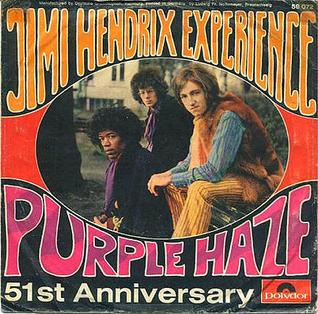
"Purple Haze" is a song written by Jimi Hendrix and released as the second single by the Jimi Hendrix Experience on March 17, 1967, in the United Kingdom. The song features his inventive guitar playing, which uses the signature Hendrix chord and a mix of blues and Eastern modalities, shaped by novel sound processing techniques. Because of ambiguities in the lyrics, listeners often interpret the song as referring to a psychedelic experience, although Hendrix described it as a love song. It was included as the opening track in the North American edition of the Experience's debut album, Are You Experienced (1967).

Edwin H. Kramer is a South African-born recording producer and engineer. He has collaborated with several artists now in the Rock and Roll Hall of Fame, including Jimi Hendrix, the Beatles, David Bowie, the Rolling Stones, Led Zeppelin, Eric Clapton, the Kinks, Kiss, John Mellencamp, and Carlos Santana, as well as records for other well-known artists in various genres.

Axis: Bold as Love is the second studio album by the Jimi Hendrix Experience. It was first released by Track Records in the United Kingdom on December 1, 1967, only seven months after the release of the group's highly successful debut album, Are You Experienced. In the United States, Reprise Records delayed the release until the following month. The album reached the top ten in the album charts in both countries.
"Little Wing" is a song written by Jimi Hendrix and recorded by the Jimi Hendrix Experience in 1967. It is a slower tempo, rhythm and blues-inspired ballad featuring Hendrix's vocal and guitar with recording studio effects accompanied by bass, drums, and glockenspiel. Lyrically, it is one of several of his songs that reference an idealized feminine or guardian angel-like figure. At about two and a half minutes in length, it is one of his most concise and melodically focused pieces.

Band of Gypsys is a live album by Jimi Hendrix and the first without his original group, the Jimi Hendrix Experience. It was recorded on January 1, 1970, at the Fillmore East in New York City with Billy Cox on bass and Buddy Miles on drums, frequently referred to as the Band of Gypsys. The album mixes funk and rhythm and blues elements with hard rock and jamming, an approach which later became the basis of funk rock. It contains previously unreleased songs and was the last full-length Hendrix album released before his death six months later.
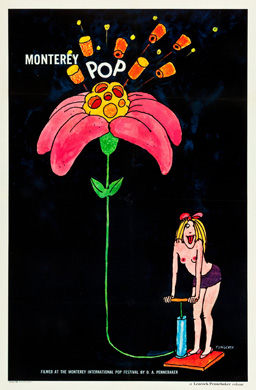
Monterey Pop is a 1968 American concert film by D. A. Pennebaker that documents the Monterey International Pop Festival of 1967. Among Pennebaker's several camera operators were fellow documentarians Richard Leacock and Albert Maysles. The painter Brice Marden has an "assistant camera" credit. Titles for the film were by the illustrator Tomi Ungerer. Featured performers include Big Brother and the Holding Company with Janis Joplin, Jefferson Airplane, Hugh Masekela, Otis Redding, Ravi Shankar, the Mamas & the Papas, the Who and the Jimi Hendrix Experience, whose namesake set his guitar on fire, broke it on the stage, then threw the neck of his guitar in the crowd at the end of "Wild Thing".

Rainbow Bridge is a 1971 film directed by Chuck Wein centering on the late 1960s counterculture on the Hawaiian island of Maui. Filmed in summer 1970 with non-professional actors and without a script, it features largely improvised scenes with a variety of characters. To bolster the film, executive producer Michael Jeffery brought in his client Jimi Hendrix to film an outdoor concert. Hendrix's heavily edited performance appears near the end of the film.
"Stone Free" is a song written by Jimi Hendrix and the second song recorded by the Jimi Hendrix Experience. It has been described as a "counterculture anthem, with its lyrics praising the footloose and fancy-free life", which reflected Hendrix's restless lifestyle. Instrumentally, the song has a strong rhythmic drive provided by drummer Mitch Mitchell with harmonic support by bassist Noel Redding. "Stone Free" was issued on December 16, 1966, as the B-side of the Experience's first UK single "Hey Joe" and later included on the Smash Hits compilation album.

Soundtrack Recordings from the Film Jimi Hendrix is the soundtrack to the documentary film Jimi Hendrix (1973). The double album was released by Reprise Records in July 1973. It contains the full-length live performances from the film and some clips from interviews. The album peaked at number 89 on the Billboard album chart, which generated concern at Reprise Records that repackaging old material would no longer satisfy the fans of Jimi Hendrix. The album has not been released on compact disc.

"Freedom" is a rock song by Jimi Hendrix that is often regarded as one of the most fully realized pieces he wrote and recorded in the months before his death. It incorporates several musical styles and the lyrics reflect various situations facing Hendrix at the time.
"Are You Experienced?" is the title track from the Jimi Hendrix Experience's 1967 debut album. It has been described as one of Jimi Hendrix's most original compositions on the album by music writer and biographer Keith Shadwick. The song is largely based on one chord and has a drone-like quality reminiscent of Indian classical music. It features recorded guitar and drum parts that are played backwards and a repeating piano octave. Live recordings from 1968 are included on The Jimi Hendrix Concerts album and Winterland box set.

"Dolly Dagger" is a song written and recorded by Jimi Hendrix. On October 9, 1971, it was released on the posthumous album Rainbow Bridge, followed by a single on October 23. Backed with a multi-tracked studio solo rendition of the "Star Spangled Banner", the single peaked at number 74 on the Billboard Hot 100, making it the last Hendrix single to appear on the main Billboard chart.

The Cry of Love Tour was a 1970 concert tour by American rock guitarist and singer Jimi Hendrix. It began on April 25, 1970, at the Forum in Inglewood, California, and ended on September 6, 1970, at the Love & Peace Festival in Fehmarn, West Germany. The majority of the 37 shows were in the United States, with two each in Sweden, Denmark, and West Germany, and one in England, where Hendrix was the final act at the Isle of Wight Festival 1970.
"Ezy Ryder" is a song written and recorded by American musician Jimi Hendrix. It is one of the few studio recordings to include both Buddy Miles on drums and Billy Cox on bass, with whom Hendrix recorded the live Band of Gypsys album (1970).
The first Atlanta International Pop Festival was a rock festival held at the Atlanta International Raceway in Hampton, Georgia, twenty miles south of Atlanta, on the July Fourth (Friday) weekend, 1969, more than a month before Woodstock. Crowd estimates ranged from the high tens of thousands to as high as 150,000. With temperatures nearing a hundred degrees, local fire departments used fire hoses to create "sprinklers" for the crowd to play in and cool off. It was a peaceful, energetic, hot and loud festival with few problems other than heat related. Concession stands were woefully inadequate. Attendees frequently stood in line for an hour to get a soft drink.

"Hear My Train A Comin'" is a blues-based song written by Jimi Hendrix. Lyrically, it was inspired by earlier American spirituals and blues songs which use a train metaphor to represent salvation. Hendrix recorded the song in live, studio, and impromptu settings several times between 1967 and 1970, but never completed it to his satisfaction.
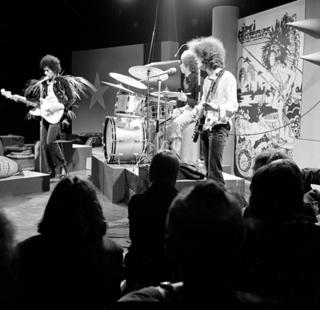
Jimi Hendrix (1942–1970) was an American guitarist and singer-songwriter whose career spanned from 1962 to 1970. He appeared in several commercially released films of concerts and documentaries about his career, including two popular 1960s music festival films – Monterey Pop (1968) and Woodstock (1970). A short documentary, Experience (1968), also known as See My Music Talking, was also screened.
"Hey Baby (New Rising Sun)" or simply "Hey Baby" is a song written and recorded by American musician Jimi Hendrix, from his second posthumous album Rainbow Bridge (1971). The song is a slower and more melodic piece, which features the prominent use of chorus- and tremolo-effects on guitar. Hendrix uses an idealized feminine figure that recurs in several of his lyrics. Commentators have seen the song as representative of his post-Band of Gypsys musical direction.
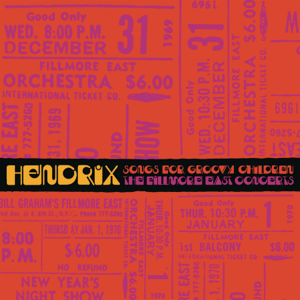
Songs For Groovy Children: The Fillmore East Concerts is a chronologically sequenced collection of American musician Jimi Hendrix's 1969–1970 New Years recorded performances at the Fillmore East in New York City. It was released as a box set of five-CDs on November 22, 2019 and an eight-LP set on December 13.
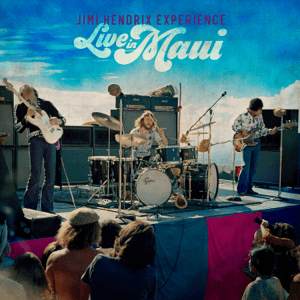
Live in Maui is an album by the Jimi Hendrix Experience documenting their performance outdoors on Maui, Hawaii, on July 30, 1970. It marks the first official release of Hendrix's two full sets recorded during the filming of Rainbow Bridge (1971). The two-CD and three-LP set was released on November 20, 2020, along with a video documentary titled Music, Money, Madness ... Jimi Hendrix in Maui.













